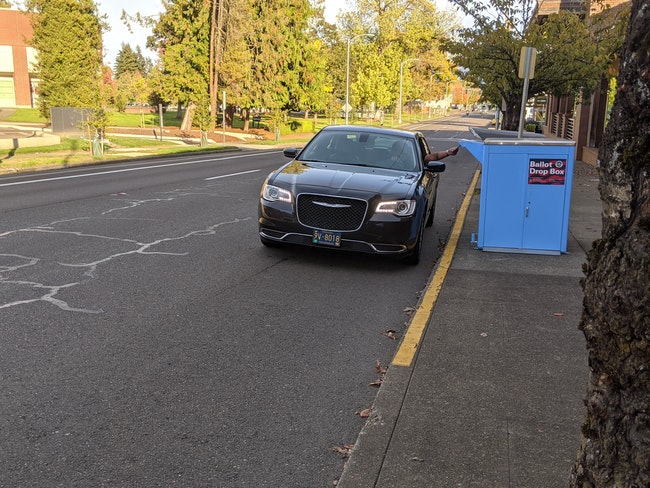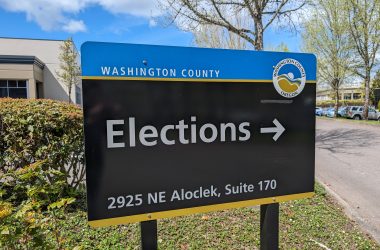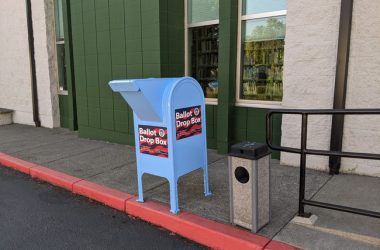 A ballot is dropped off in Forest Grove on Sunday, October 18. Photo: Chas Hundley
A ballot is dropped off in Forest Grove on Sunday, October 18. Photo: Chas Hundley
While President Donald Trump and former Vice President Joe Biden dominate the news during this October of 2020, here in Oregon there is a measure on the November 3 ballot that could change the state constitution and the future of campaign contributions at all levels throughout the state.
Measure 107, referred by the state legislative assembly to the 2020 ballot, would amend Article II Section 8 of the Oregon Constitution to allow the state, counties, and cities to individually limit political contributions and expenditures.
Currently, Oregon sets no limits on how much or how often individuals or groups can contribute to political campaigns or ballot measure appeals, including out-of-state donors.
The measure also would require political candidates to disclose, in detail, in-kind expenditures – in-kind donations received by candidates are by definition services donated and provided to a candidate in lieu of cash contributions.
It would also require advertisements to disclose who created and paid for their content for campaigns or ballot measures.
Right now, only vague responses are required to identify how an in-kind contribution, expenditure, or cash contribution is used, and there are no requirements at the state level for political ads to disclose who paid for their message.
For example, indeterminate terms, such as “operating expenses,” currently are being used by candidates to describe how tens of thousands of dollars, and often in state races more than $100,000, is being spent under the guise of operating expenses when the average campaign has only a handful (at best) of paid staff during election season.
From the standpoint of many individual voters, it seems like a no-brainer to put limits on campaign finance contributions, cash donations, and clear identifiers as to who created political advertising content
Also, observers of Measure 107 say details of in-kind services provided need to be much more transparent, detailing exactly how they are used, as well as how the dollar amount was determined by the donor for the in-kind contribution.
The Oregon Supreme Court this year overruled the court’s 1997 decision, ruling that campaign finance contributions – cash contributions – are not an inherent right provided by the Oregon Constitution
Measure 107 is the latest attempt by the state’s electorate to limit campaign contributions and to make the reporting of them much more detailed, and as a byproduct of the process creating more transparency for the public.
Oregon voters in 1995 cast their ballot for a state-wide measure to cap campaign contributions at $500 per individual donor. But in 1997, the Oregon Supreme Court ruled in the case of Vannatta v. Kiesling that a constitutional amendment is required to pass laws that limit campaign contributions and some expenditures.
The state supreme court in 1997 made it clear that limiting how much money an individual or group can contribute to a campaign or ballot measure appeal is no different than limiting that person’s or group’s right to free speech.
In other words, money equals free speech, which similarly happened at the federal level in the infamous U.S. Supreme Court ruling in the 2010 Citizens United V. Federal Elections Commission case, which protected campaign contribution money as free speech.
Oregon voters tried again in 2006 to pass a measure limiting campaign donations and contributions, but voters did not pass the state constitutional amendment required to go along with voting for the measure. So, the Oregon Supreme Court ruling stood until earlier this year until a surprise about-face by the current bench of seven justices.
(On a side note, unlike U.S. Supreme Court justices who are appointed for life, Oregon Supreme Court judges serve six-year terms and are required to run for re-election at the end of each term.)
In April 2020, the Oregon Supreme Court reversed the original 1997 ruling, saying that the Oregon Constitution does not specifically say financial contributions are equal to free speech or that unlimited campaign contributions are inherently constitutional.
So, what do the individual candidates for House Districts 31 and 32 say about current campaign finance laws, especially regarding transparency, during this 2020 election cycle? Some of the answers may surprise some voters and readers.
 Help us increase our 2020 election coverage with a digital subscription, featuring a $10 discount now through November 3 for an annual subscription. Monthly plans are $8/month. Click here to start
Help us increase our 2020 election coverage with a digital subscription, featuring a $10 discount now through November 3 for an annual subscription. Monthly plans are $8/month. Click here to start
What our region’s House District 31 and 31 candidates say about current Oregon campaign finance rules and transparency
The Banks Post talked to each of the four candidates, either via telephone or email interviews, running for the House District 31 and House District 32 seats – the Oregon state legislative districts that envelope the largest portion of the Banks Post coverage area.
We asked them how each feels about current campaign finance laws and the inclusion of Measure 107 on the ballot.
Those candidates are: From House District 31, incumbent Bradley Whitt (D-Clatskanie) who is facing challenger Brian Stout (R-Columbia City) for the position in the second-consecutive campaign battle for the House District 31 seat between the two candidates in as many years.
House District 31 has Tillamook Mayor Suzanne Weber (R-Tillamook), who also has the Independent Party of Oregon’s endorsement as a candidate, facing off against Debbie Boothe-Schmidt (D-Astoria), who had been a long-time member and leader of Oregon AFSCME Council 75 (the Association of State, County, and Municipal Employees union, which represents more than 24,000 members throughout Oregon). AFSCME is a national union with local offices in Oregon, and a major campaign contributor for many years in this state’s elections.
Each district candidate was asked about their position on in-kind contributions and how they are used, and whether they feel there should be more transparency requirements for in-kind contribution state filings – contributions from groups, nonprofits, businesses and corporations, and political action committees (PACs), as well as out-of-state donors.
Oregon allows out-of-state donors to provide cash and/or in-kind contributions to any candidate, or candidates, they choose to support, but not at the municipal level, where city councilors and mayors are supposed to be nonpartisan.
There are just 11 states (Alabama, Indiana, Iowa, Mississippi, Nebraska, North Dakota, Oregon, Pennsylvania, Texas, Utah, and Virginia) that don’t have campaign contribution limits for individual donors. The remaining 39 states restrict individual campaign contributions depending on what elected office a candidate is trying to win, but in many instances, there are no limits .
Of the two candidates running for House District 31, as of Oct. 20, incumbent Witt received a total of $160,745 in cash contributions and $47,375 of in-kind contributions. Likewise, through Oct. 20, Witt’s challenger, Stout, received $25,980 in cash contributions and $325 of in-kind donations, state finance data shows.
As for the House District 32 candidates, the same state finance data through Oct. 20 reveals that Tillamook Mayor Suzanne Weber has received $213,780 in in-kind contributions and $375,092 in cash donations – she received about $70,000 more than she had in cash contributions in a five-day period from Oct. 15 to Oct. 20.
Weber’s opponent, Boothe-Schmidt, received in-kind donations through Oct. 20 totaling $427,602, which outpaced Weber’s in-kind contributions since Oct. 15 – Boothe-Schmidt raised about $17,000 more than Weber during that five-day period. Her total campaign contributions as of Oct. 20 reached $655,980 compared to Weber’s $666,302 in both cash and in-kind contributions.
In-kind contributions for both Weber’s and Boothe-Schmidt’s respective campaigns, as well as those of Witt and Stout, provide interesting snapshots into the lack of transparency candidates for state office are afforded in Oregon, and what level of details candidates are required to submit with the Oregon Secretary of State’s Elections Division.
Part II of this series, scheduled to run tomorrow, Oct. 22, will explore and explain in-kind contributions from four regional House District candidates (Suzanne Weber and Debbie Boothe-Schmidt for House District 32; Bradley Witt and Brian Stout for House District 31). Part II of this story primarily will focus on one PAC or group that donated the most in-kind contributions to each candidate, what service(s) the candidate received for those contributions to their campaign, and the impact of measure 107 on future races if it is passed.






